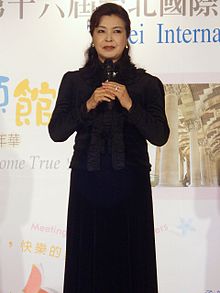Riyoko Ikeda
| Riyoko Ikeda 池田 理代子 | |
|---|---|
 Riyoko Ikeda at 2008 Taipei International Book Exhibition | |
| Born | December 18, 1947 Osaka, Japan |
| Nationality | Japanese |
| Area(s) | Writer, Penciller, Inker |
Notable works | The Rose of Versailles Oniisama e |
Riyoko Ikeda (池田 理代子, Ikeda Riyoko, born December 18, 1947) is a Japanese manga artist and singer. She is included in the Year 24 Group.[1] She was one of the most popular Japanese comic artists in the 1970s, being best known for The Rose of Versailles.
Career
Ikeda has written and illustrated many shōjo manga, many of which are based on historical events, such as the French Revolution or the Russian Revolution. Her use of foreign settings and androgynous themes made The Rose of Versailles and Orpheus no Mado "enormous successes".[2]
Her most famous manga is The Rose of Versailles also known as Lady Oscar in Europe. This manga, loosely based on the French Revolution, has been made into several Takarazuka musicals and into an anime series and a live-action film. After Rose of Versailles concluded, Ikeda wrote articles for Asahi Shimbun. In the 2000s Ikeda studied at a music school and became a singer. Her voice is in the soprano range.[3] She made a comeback to the comic industry as a scenarist in 1999.[citation needed] Her recent manga includes Der Ring des Nibelungen. It is a manga version of the opera written by Richard Wagner.
In 2008, she received France's Ordre national de la Légion d'honneur for her contribution to Japan's cultural awareness of France,[4] and she has been a guest of the 2011 Angoulême International Comics Festival.[3]
Works
- Bara Yashiki no Shōjo (1954) — short story
- Soyo Kaze no Mary — short story
- Francesca no Shouzou (1969)
- Sokoku ni Ai o (1969)
- Freesia no Asa (1970)
- Futari Pocchi (1971)
- Ikite te Yokatta! (1971)
- Jinchouge (1971)
- Mariko (1971)
- Sakura Kyou (1972)
- Berusaiyu no Bara (1972) — The Rose of Versailles
- Shiroi Egmont (1973)
- Yureru Soushun (1973)
- Shōko no Etude (1974)
- Oniisama e (1975)
- Orpheus no Mado (1975)
- Claudine (1978)
- Ayako (1980)
- Epitaram: A Wedding Song (1981)
- Aoi Zakuro (1983)
- Jotei Ecatherina (1983)
- Berusaiyu no Bara Gaiden (1984) — extra chapters for The Rose of Versailles
- Eikou no Napoleon – Eroica (1986)
- Glass no Yami (1987)
- Mijo Monogatari (1988)
- Kasuganotsubon - Kefuzo Kataku o (1989)
- Porando Hishi Ten no Hate Made (1991) — Poland's Secret Story: To the Borders of Heaven
- Shoutoku Taishi (1991)
- Fuyu no Shukusai (1997)
- Elizabeth (1999) — text only; art by Erika Miyamoto
- Niberunku no Yubiwa (2000) — Der Ring des Nibelungen
- Ikeda Riyoko the Best: Ai to Tatakau Onnatachi (2001)
- Falcon no Meikishu (2004)
- Ai wa Waltz ni Nosete (2005)
- BeruBara Kids (2006) — The Rose of Versailles Kids (parody)
- Haru no Yuki (2006) — Spring Snow
- Taiyou Shijinki (2007)
- Taketori Monogatari (2014)
References
- ^ Thorn, Matt (2005). "A History of Manga". Animerica: Anime & Manga Monthly. 4 (2, 4, & 6). Retrieved 2008-01-02.
- ^ Halldór Stefánsson (1994). "Foreign myths and sagas in Japan: the academics and the cartoonists" in Beyond Boundaries: Understanding, Translation and Anthropological Discourse, p. 88, edited by Gísli Pálsson. Berg Publishers. ISBN 1-85973-021-3
- ^ a b Fallaix, Olivier (November 17, 2010). "Riyoko Ikeda au festival d'Angoulême" (in French). Animeland. Retrieved November 22, 2010.
- ^ "Rose of Versailles' Ikeda Receives France's Top Honor". Anime News Network. 2009-03-12. Retrieved 2009-07-11.
